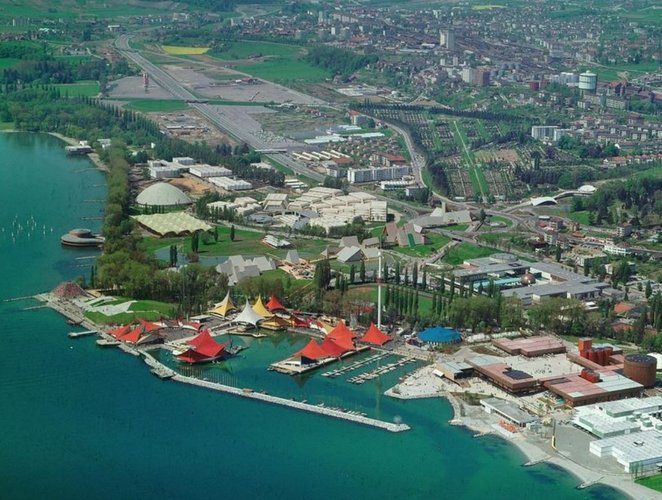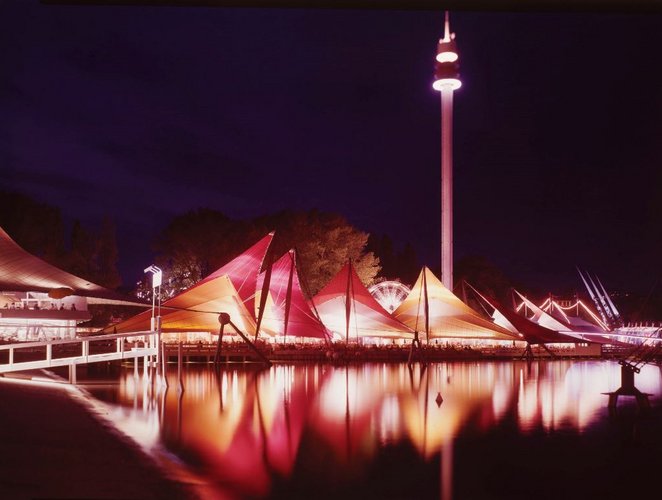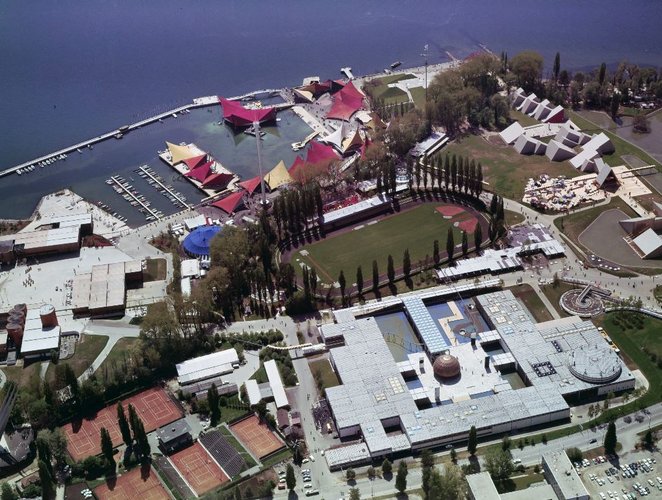During the Cold War, the Lausanne Expo once again highlighted Swiss values. Especially in the concrete hedgehog of the army. But it also presented an open country. For example, through the short film project: Die Schweiz im Spiegel.
Markus Kutter, Lucius Burkhard and Max Frisch presented a prelude of ideas in 1955. In a small book entitled Achtung: die Schweiz, they proposed that the country should not be exhibited in pavilions, but in its natural setting, which was to be a real model town, built on the waterfront somewhere in French-speaking Switzerland. After a broad public debate, the decision was made to hold a regular national exhibition, which opened in Lausanne on 30 April 1964. This time again, more than 10 million tickets were sold.
Film and self-mockery of Swiss identity
A new medium, film, was used for the first time in an offensive and creative way at Expo64. Five short films on various themes of everyday life were shown as part of the project Die Schweiz im Spiegel.. The road to Switzerland corresponded to the Zurich Landi's route to the peaks. All the visitors remembered the flags of the 3'000 Swiss communities.
Gulliver in the land of the Swiss
Gulliver, a hero straight out of Jonathan Swift's tale, came to our country for Expo64, the Swiss National Exhibition in Lausanne-Vidy. Curious about life in Switzerland, the giant welcomes visitors to Expo64 in its central section, La Voie Suisse. There he invites the Swiss to play a game in the form of a fun questionnaire.
The Expo64 hostesses hand out Gulliver's notebook to intrigued visitors. In a humorous way, Gulliver introduces himself and invites them to play a game of twelve questions and answers about their daily lives, formulated in a playful and friendly way: "Can you be a good Swiss and never vote?", "Can you be a good Swiss and get up at 9am?" The giant, the brainchild of director Charles Apothéloz, ethnologists and sociologists, wants to discover, like a foreigner, the particularities of the Swiss way of life.
During the entire duration of Expo64, tens of thousands of questionnaires were distributed. The amused visitors answer attentively, with their families or friends. Some compare their results and revise their answers. The answers were recorded, compiled and analysed using the first modern computers.
The giant and the censors
In the manner of a living democracy, the evolution of the survey is to be displayed continuously on large panels at the entrance to the Swiss Way. It is not. The management intervenes, and the results are never made public. They were the subject of a controversy reported in the press between Gulliver's father, the management and the Confederation's representative to the Expo, Hans Giger.
Gulliver is still remembered for Expo64. For many, he is the curious giant who came to meet the Helvetians at Lausanne-Vidy. For others, the controversy surrounding the game and the censorship of the results of the survey leave the memory of a rather unwelcome character in the land of the Swiss.
Photos: © ETH-Bibliothek Zürich, Bildarchiv / Fotograf: Comet Photo AG (Zürich)





